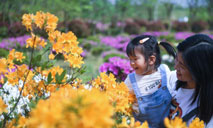Specialty industries boost rural vitalization in Guangxi

Chinese President Xi Jinping, also general secretary of the Communist Party of China Central Committee and chairman of the Central Military Commission, visits a food-processing zone for local specialty Luosifen rice noodles in the city of Liuzhou, south China's Guangxi Zhuang Autonomous Region, April 26, 2021. (Xinhua/Ju Peng)
NANNING, April 27 (Xinhua) -- Last year, Huang Jihua, a 36-year-old bamboo grower in Baile village in the Chinese city of Liuzhou, saw surging sales in bamboo sprouts, an essential ingredient for Luosifen, a local specialty rice noodle.
"The price of bamboo sprouts soared as Luosifen also became popular elsewhere in the country," said Huang, adding that bamboo sprouts brought his family revenue of over 200,000 yuan (about 30,850 U.S. dollars) in 2020.
President Xi Jinping on Monday visited a food-processing zone for Luosifen rice noodles during his inspection of Liuzhou, south China's Guangxi Zhuang Autonomous Region.
It is not an easy task to develop a small rice noodle business into such a large industry, said Xi, also general secretary of the Communist Party of China Central Committee and chairman of the Central Military Commission.
As a local signature dish, the magic of Luosifen lies in its broth, which is made by stewing river snails for hours with several seasonings and spices. The noodle is usually served with pickled bamboo, dried turnip, fresh vegetables, and peanuts.
Food booths selling Luosifen are everywhere in Liuzhou. Now the inexpensive street food has become a national delicacy.
Instant Luosifen noodles are even exported to over 20 overseas markets and had an output value of over 10 billion yuan last year.
The rise of Luosifen has triggered an "industrial revolution" in the local rice noodle industry. It boosts local rural vitalization as over 200,000 Liuzhou farmers plant and cultivate raw materials for Luosifen like rice, beans, snails, bamboo shoots, and fungi.
Farmers in Guangxi also rely on other industries to strive for a prosperous life.

Chinese President Xi Jinping, also general secretary of the Communist Party of China Central Committee and chairman of the Central Military Commission, visits a food-processing zone for local specialty Luosifen rice noodles in the city of Liuzhou, south China's Guangxi Zhuang Autonomous Region, April 26, 2021. (Xinhua/Yin Bogu)
On Sunday, Xi visited Maozhushan village in Guilin to inspect the local grape-growing industry. He called for efforts to pursue rural vitalization based on local specialty industries and make better use of science and technology in promoting the agricultural sector.
As the grape blossom season approaches, Wang Shirui dives into his busy days tending the family's vineyards in Maozhushan village.
Wang told Xinhua that agricultural technicians invited by the local government would come now and then, providing technical support to grape growers.
The 63-year-old farmer has kept his routine for over 20 years. Like most fellow villagers, Wang lives a relatively affluent life with his grape plantation. Last year, his family earned over 100,000 yuan from the 13 mu (about 0.87 hectares) grapes his family planted.
"In August and September each year, merchants from Guangxi and the neighboring provinces of Hunan and Guangdong swarm into the village to buy our grapes," said Wang.
Wang Junrong, Party chief of Nanyi village, which administers Maozhushan, said the village churns out a great variety of high-quality grapes with over 21 hectares of vineyards.
Grape planting has vastly increased the locals' income, and their per capita disposable income reached 30,000 yuan last year, said the village official.
"Inspired by our success, other villages nearby gradually joined the industry and have plowed over 1,300 hectares of vineyards," he said.
Photos
Related Stories
Copyright © 2021 People's Daily Online. All Rights Reserved.










